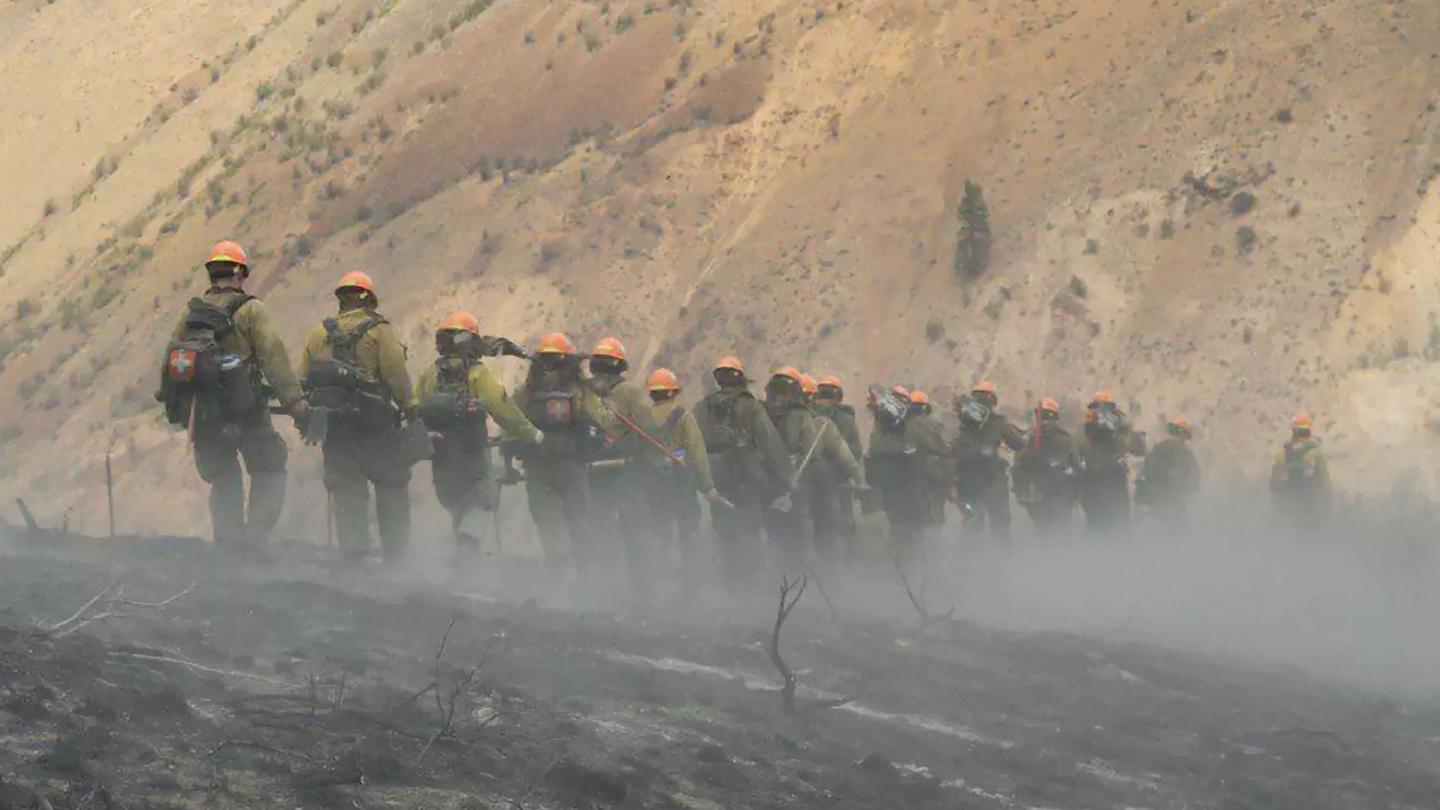On the Fireline
Brigham Snow ’14 traded his desk job to fight wildfires with the Hotshots
BY ELLEN RYAN
Light smoke was rising from a row of spruce and sub- alpine firs threatening to ignite as Brigham Snow ’14 and his fellow Snake River Hotshots ascended a ridge in Idaho’s Salmon-Challis National Forest. It was July 2023, and even the mountains were under a heat advisory.
The crew’s mission: fell the trees before they became dangerous, scramble up rough terrain to a high point and establish a fireline by doing a controlled burn that would deprive the wildfire of fuel when it arrived.
The Hayden Fire chased up the Lemhi Range for a week, then another week. The Hotshots chased ahead, mostly at night, with helicopters and planes, water, fire retardant, ignition devices, chainsaws, axes and hand tools. Felling trees, removing brush, digging trenches — as Snow and his “hand crew” accumulated layers of grime and soot day by day that settled into their skin and hair and lungs.
Snow would lie in his sleeping bag, thinking about the night he’d awakened at 4 a.m. to see flames rising over their ridge; the crew had to pack up quickly and head to safety. He mulled the times the Hotshots lost their fireline and had to hike to the next best area, carrying gear, and start over.
Ten days in, the main fire hit another tinder pocket, and Snow’s crew had to back off for a time “to watch it chew up a mountainside.” At the end, the exhausted but successful crew’s shift stretched to a bone-aching sunup-to-sunup.
All this for $16 an hour, with only partial hazard and overtime pay and no off-season benefits.

A wildfire hand crew hikes through burned ground on last year’s Moose Fire near Salmon, Idaho.
Snow has spent nearly three years with the Snake River Hotshots, one of 115 elite federal interagency teams of wildland firefighters that respond to large, high-priority fires across the country and abroad. It’s a long way from playing varsity lacrosse and JV hockey, singing with the T-Tones and heading up the SPS Investment Club — or from studying at Amherst, where he pursued similar interests and spent a summer at the London School of Economics before three years in strategy and research at Liberty Mutual Insurance.
Why run off to fight wildfires? Snow admits that the dichotomy was “an otherworldly experience.” There had always been a leaning toward public service, though, toward commitment and challenge and doing for the community. That old idea of purposeful lives in service to the greater good. “What else out there embodies those values?” Snow mused. Search and rescue, maybe — and then he read about wildfires.
The journey from his desk at Liberty Mutual to the Snake River frontlines took two years and hundreds of phone calls, followed by firefighting courses, a certification and fitness tests before training. Snow is the first to allow that his path was hardly typical. “First, [there was] my lack of knowledge around how the complicated hiring process worked, but second (and much more importantly), because I had no prior firefighting experience, I had to find a Hotshot crew that would take a chance on such an individual, particularly one who worked in an office,” he says. “That confused a lot of crew bosses and raised a lot of doubts.”
Snow says he appreciates the “kind, thoughtful, amazingly diverse” crew he works alongside. On deployment to Alberta, he’s worked with firefighters from Canada and Australia, and he cites among the upsides of his work the opportunity to experience a variety of natural wonders: “desert, swamps, alpine forest, mountain lakes. … You live outdoors for the job, so you see spectacular monsoons, stars and sunsets.”
The physical demands of the work require the Hotshots to be in great shape — but those demands break them down, too. “The long-term health risks are real,” says Snow, who has watched the stress of firefighting take a toll on necks, backs and knees — not to mention elevated cancer and heart disease risk. All of that, on top of the very real risk of devastating injury and even death he and his fellow Hotshots face in the line of duty. In a few years, he sees a transition to a more sustainable lifestyle.
In the meantime, Congress is contemplating the proposed Wildland Firefighter Paycheck Protection Act, which could raise entry-level federal firefighters’ base pay by 42 percent. The reform would make a difference, and Snow supports its passage. He’s written to legislators, advocates in his network and has done media interviews. “In my experience, wildland firefighters embody silent professionalism to an almost detrimental degree,” he says, “and the public’s increasing awareness about these issues has benefited from stories directly from the fireline.”
Speaking up for his colleagues is an immediate goal. Longer term, any new work would have to have a purpose and a physical challenge, he says. Maybe something fighting climate change — “on the forefront of these efforts rather than mitigation and recovery,” he says.
The particulars are unclear at this point. Says Snow with a laugh, “The desk will always be there.”